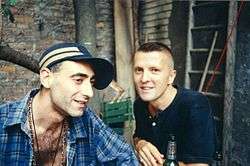Neue Deutsche Welle
| Neue Deutsche Welle | |
|---|---|
| Stylistic origins | |
| Cultural origins | Late 1970s, Germany |
| Typical instruments | |
| Other topics | |
Neue Deutsche Welle (NDW, pronounced [ˈnɔʏə ˈdɔʏtʃə ˈvɛlə]; "New German Wave") is a genre of german rock music originally derived from post-punk and new wave music with electronic influences.[1] The term "Neue Deutsche Welle" was first used in a record shop advertisement by Burkhardt Seiler[2] in the German magazine Sounds in August 1979, and then coined by journalist Alfred Hilsberg whose article about the movement titled "Neue Deutsche Welle — Aus grauer Städte Mauern" ("New German Wave — From Grey Cities' Walls") was published in Sounds in October 1979.[3]
History

The history of the Neue Deutsche Welle consists of two major parts. From its beginnings to 1981, the Neue Deutsche Welle was mostly an underground movement with roots in British punk and new wave music; it quickly developed into an original and distinct style, influenced in no small part by the different sound and rhythm of the German language which many of the bands had adapted from early on. Whilst some of the lyrics of artists like Nena and Ideal epitomized the Zeitgeist of urban West Germany during the Cold War, others used the language in a surreal way, merely playing with the sound or graphic quality of the language rather than using it to express meaning, as done by bands and artists like Spliff, Joachim Witt and Trio.
The main centers of the NDW movement during these years were Berlin, Düsseldorf, Hamburg, Hannover and Hagen as well as, to a lesser extent, the Frankfurt Rhein-Main Region, Limburg an der Lahn and Vienna (Austria).
From about 1980 on, the music industry began noticing the Neue Deutsche Welle; however, due to the idiosyncratic nature of the music, the focus shifted to creating new bands more compatible with the mainstream, rather than promoting existing bands. Many one-hit wonders and short-lived bands appeared and were forgotten again in rapid succession, and the overly broad application of the "NDW" label to these bands as well as to almost any German musicians not using English lyrics, even if their music was apparently not influenced at all by the 'original' NDW (including pure rock bands like BAP or even Udo Lindenberg) quickly led to the decay of the entire genre when many of the original musicians turned their backs in frustration.
Around 1983/1984, the era of the Neue Deutsche Welle came to an early end, following the oversaturation of the market with what was perceived as stereotypical, manufactured hits.
A revival of interest in the style in the Anglophone world occurred in 2003, with the release of DJ Hell's compilation New Deutsch.[4] The NDW has come to be acknowledged as a forerunner to later developments in dance-punk, electronic body music, and electroclash.
In the 2000s, the term is being used by the Berlin-based rap label Aggro Berlin to describe a supposed new German rap movement that they claim to be a part of. This was the subject of Aggro-signed Fler in his 2005 single Neue Deutsche Welle.
Notable bands
Underground
- Abwärts
- Andi Arroganti
- Andreas Dorau
- Andy Giorbino
- Carambolage
- Daälbers
- Deutsch Amerikanische Freundschaft / DAF
- DIN A Testbild
- Duotronic Synterror
- Einstürzende Neubauten
- Familie Hesselbach
- Fehlfarben
- Foyer des arts
- Front
- FSK (Freiwillige Selbstkontrolle)
- Geile Tiere
- Geier Sturzflug
- Geisterfahrer
- Große Freiheit
- Grauzone
- Hans-A-Plast
- Holger Hiller
- Ja Ja Ja
- KeinMenscH!
- Der KFC
- Die Klopferbande
- Kosmonautentraum
- Kowalski
- Die Krupps
- Liaisons Dangereuses
- Malaria!
- Male
- Mania D
- Mittagspause
- Der Moderne Man
- Mythen in Tüten
- Neonbabies
- Östro 430
- Palais Schaumburg
- Der Plan
- Pyrolator
- Die Radierer
- Rheingold
- Saal 2
- Stahlnetz
- Stratis
- S.Y.P.H.
- Sprung Aus Den Wolken
- Die Tödliche Doris
- Tommi Stumpff
- Trümmerfrauen
- Die Unbekannten
- The Wirtschaftswunder
- X-Mal Deutschland
- Die Zimmermänner
Note: Many of the underground groups were commercially successful; the dichotomy between underground and commercial NDW-groups has more to do with differences in sound, presentation and attitude.
Mainstream
- Bärchen und die Milchbubis
- Boys in Trouble
- Combo Colossale
- D.E.F.
- DÖF ("Deutsch-österreichisches Feingefühl": Joesi Prokopetz, Manfred Tauchen, Annette Humpe)
- Extrabreit
- Falco
- Felix De Luxe
- Fräulein Menke
- Gänsehaut
- Ideal
- Insisters
- Ixi
- Geier Sturzflug
- Hubert Kah
- Jawoll
- Joachim Witt
- KIZ
- Klaus Nomi
- Kraftwerk
- Markus
- Münchener Freiheit
- Nena
- Nichts
- Nina Hagen
- Paso Doble
- Peter Schilling
- Spider Murphy Gang
- Spliff
- Steinwolke
- Trio - preferred the label Neue Deutsche Fröhlichkeit ("New German Cheerfulness") to describe their music.
- UKW
- United Balls
See also
References
- ↑ Nancy Kilpatrick, The Goth Bible: A Compendium for the Darkly Inclined, New York: St. Martin's Griffin, 2004, chapter 5, "Music of the Macabre," p. 84.
- ↑ Neue Deutsche Welle - Blog summary includes an image of the original advertisement published in Sounds 08/ 79.
- ↑ Neue Deutsche Welle - Aus grauer Städte Mauern (Sounds 10/ 79).
- ↑ Laurence Phelan, The Independent, August 31, 2003. Access date: July 22, 2008.
External links
- IchWillSpass.de - Die Neue Deutsche Welle im Internet (German)
- Punk-Disco - Discographies of many German punk and NDW bands. (German)
- Back Again – many Infos about NDW Bands (German)
- Neue Deutsche Welle on Avant-Avant.net